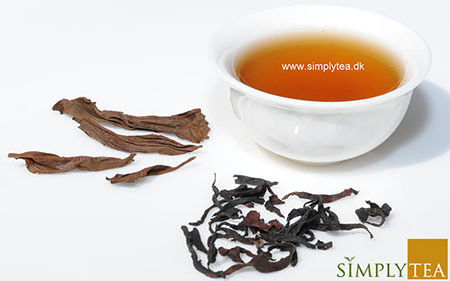There is a black tea that can make us completely blissful. We do not hesitate to call it the world’s best black tea. We tasted it in 2011 when we traveled to Yunnan Province in China, and that day our destination was a very old tea tree.
After many hours of driving up and down small winding mountain roads, we finally reached the place where the tea tree stood firmly planted in the ground with its ancient roots. 3000 years old—so say those knowledgeable about such things. A giant of a tea tree, so large that it took eight men to reach around it. To protect it, the government has surrounded it with a wall, and the gate to the area was locked when we arrived.
It took connections with officials at higher levels to gain access to the tree, but then a man with a key appeared, and we were let in to admire the ‘sanctuary’ up close.
While we waited for the key, we had invited ourselves for tea at a neighbor’s house, who conveniently turned out to be a tea master. We were offered tea—black tea, which is unusual in China, as most of that type is produced for export.
The tea was exquisite. Excited by this unexpected find, we bought some to take home and have only drunk it on special occasions. It was clear, due to the remoteness of the place, that it would be difficult to obtain again.
The beautiful old tree, which experts estimate to be 3000 years old. Yunnan Province, China 2011.
The black tea from the area near Lincang in Yunnan has since stood as a shining star in the sky above all other black teas we have tasted. Nothing has been able to challenge its position, and the longing for its nectar-like soft and sweet drops has lingered, just like the thought of how we would be able to obtain it again.
On our trip to China this year, we also traveled to Sichuan. We had the great pleasure of visiting Zhuping’s sister and her husband in the million-city of Chongqing. Here, they run a tea business and have extensive knowledge, especially of Pu-erh teas, which is evident from the many examples that surrounded us.
When you enter a Chinese tea shop, you are quickly seated around a tea table and offered several exquisite teas. So it was again this time. The conversation flowed lively, and once again, a new tea was poured. In a corner of our awareness, we caught that it was a black tea. But suddenly, Alexis and I looked at each other with shining eyes—it was ‘our tea’ from the 3000-year-old tea tree. Or at least a tea that resembled it closely.
Li Dong (Zhuping’s brother-in-law) is the ceremony master and serves us today’s surprise: Rare Black Wild Yunnan Tea. Chongqing, China 2013. It turned out to indeed be tea from very old trees, picked not far from ‘our’ 3000-year-old tea tree.
The tea is picked deep in the forest in an area that lies 2600 meters above sea level. Already at five in the morning, the tea pickers start to reach the old, wild tea trees. Most often, they do not return home until around 5 p.m. The tea is already oxidized and cannot be used for Pu-erh. Therefore, it is made into a black tea. The leaves undergo a light oxidation, which gives the tea its bright, golden color—and not the red color that typically characterizes black tea (in China, black tea is referred to as red tea due to the color of the brewed tea).
Rare Yunnan Black Tea has a sweetness and fullness that is completely incomparable. It settles like a velvety film on the palate and tongue, lingering pleasantly for half an hour or more after you have consumed the tea. The color is pure and golden.
It is a tea that one should allow oneself to enjoy in peace and quiet, while thinking of nothing but an area deep inside a forest high up on a mountain, where ancient, wild tea trees stand peacefully and produce these leaves year after year—regardless of whether anyone comes to pick them or not. But fortunately for us, they do. And they are picked gently and brought the long way back to the tea master, who also skillfully processes the leaves, allowing us to miraculously sit here thousands of kilometers away and enjoy its precious golden brew.
Try it for yourself!

